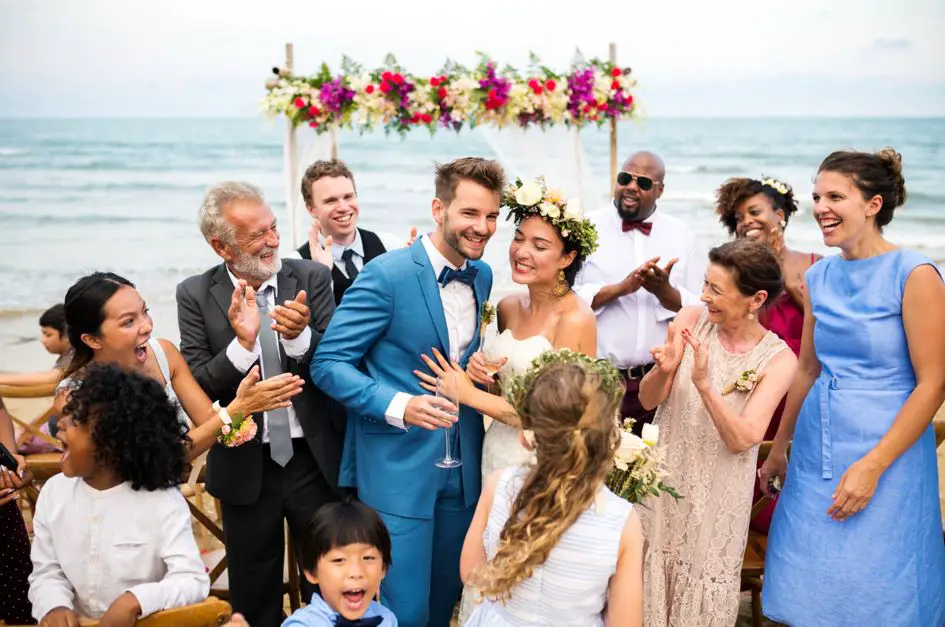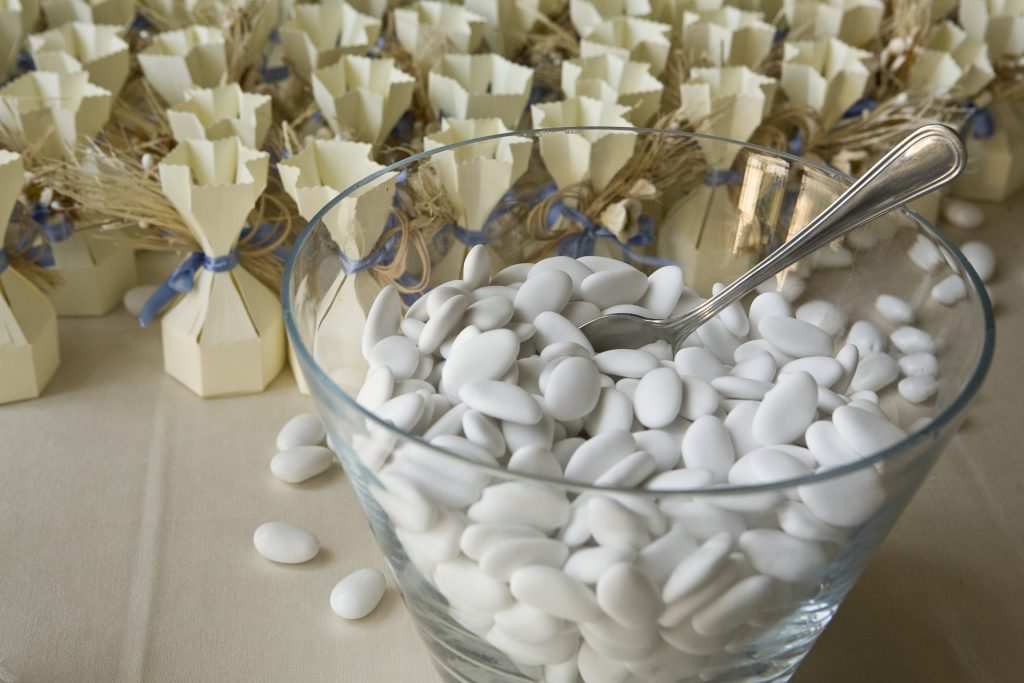Wedding favours are a cherished tradition that symbolises gratitude, good fortune, and appreciation for guests who attend the celebration.
The origins of this custom stretch back centuries, and although favours have evolved, their purpose remains the same: to honour the guests who share in the joy of the wedding day.
Here’s an exploration of why favours are given at weddings, including the tradition’s rich history and how couples express their gratitude.
Let’s get straight to the point
A time-honoured tradition in weddings, favours symbolise gratitude and appreciation for guests.
Originating centuries ago among European aristocrats as symbols of wealth and good fortune, they have evolved into thank-you tokens ranging from personalised keepsakes to eco-friendly or charitable options.
Favours enhance the guest experience, reflect cultural heritage, and serve as lasting mementos of the couple’s special day, creating a heartfelt connection with everyone who shares their joy.
1. Expressing Gratitude To Guests

A wedding is a significant celebration where family and friends gather to support the couple as they embark on a new chapter in life.
Wedding favours are a tangible expression of gratitude for the time, effort, and love guests show by attending.
Many couples feel that favours are a way to say a heartfelt thank you that goes beyond words. This gesture acknowledges the guest’s role in making the day special and memorable.
- Tokens of Thanks: Favours are small, thoughtful gifts that say “thank you” in a meaningful and memorable way.
- Beyond Words: While expressing gratitude verbally is valuable, a physical token can further demonstrate the couple’s appreciation.
- Customised for the Occasion: Personalised favours, such as items with the wedding date or the couple’s initials, make the gesture even more special and memorable for guests.
2. A Tradition Rooted In History
The custom of giving wedding favours has deep historical roots. Originating among European aristocrats, wedding favours were originally symbols of wealth, fortune, and appreciation.
Over time, the practice became popular among the general public, yet the core purpose remains the same.
- European Aristocratic Origins: In the 16th century, wealthy families in France and Italy began gifting bonbonnières-small, elaborate boxes filled with sugar-based treats. Sugar was an expensive commodity that symbolised wealth and fortune.
- The symbolism of Five Jordan Almonds: At some weddings, the tradition of giving five almonds continues today. Each almond represents the couple’s wishes: fertility, health, wealth, happiness, and longevity.
- Symbol of Good Luck: Couples believed they were passing along good fortune by sharing favours with guests, allowing guests to take home a part of the celebration’s happiness and luck.
3. Creating A Lasting Memento Of The Day
Wedding favours also act as keepsakes that guests can hold onto long after the event. For many, these small tokens are reminders of a day filled with joy, love, and togetherness.
- Personalised Memories: Customised favours, such as candles with the couple’s initials or mini photo frames, help guests remember the special day and keep a piece of it with them.
- Wedding Décor and Favours in One: When favours match the wedding’s theme, they can serve as part of the event’s décor, adding to the ambience and beauty of the setting.
- Creating Memories: Meaningful favours, like mini plants, photo booth pictures, or simple tokens, remind guests of the event and allow them to relive fond memories.
4. Enhancing The Guest Experience
For couples who focus on the guest experience, favours are a way to enhance the enjoyment and atmosphere of the wedding day, ensuring that guests feel appreciated and engaged.
- Interactive Favours: Photo booths, caricature artists, or interactive games double as entertainment and take-home souvenirs for guests.
- Practical Gifts: Practical favours like custom bottle openers, mini succulents, or reusable tote bags provide guests with a useful keepsake they can use long after the wedding.
- Donation instead of Favours: For couples who prefer a more meaningful gesture, donations to a favourite charity on behalf of their guests can create a lasting impact. Setting up donation jars at the wedding, where guests can “vote” for a cause, adds a unique and engaging element.
5. Honouring Cultural And Family Traditions
Many couples see wedding favours as a way to uphold family or cultural traditions, preserving customs that are significant to their families and communities.
- Cultural Heritage: In Italian culture, for example, the custom of giving Bomboniere-small boxes filled with sweets or almonds-dates back generations, with favours symbolising luck and fortune for the couple and guests.
- Honouring Family Traditions: Many families have favours passed down or adapted through generations. Items like engraved coins, embroidered handkerchiefs, or small heirlooms are common for couples who want to honour their lineage.
- Modern Twist on Tradition: Couples may reimagine traditional favours to reflect their unique identities in contemporary weddings. For instance, they may give locally made items, supporting artisans from their cultural background or family’s origin.
6. Embracing Eco-Friendly Practices
As sustainability becomes increasingly important, couples often seek environmentally friendly alternatives for their wedding favours, choosing options that reflect their values.
- Eco-Friendly Choices: Many couples now opt for live plants like mini succulents or herbs, which are beautiful and sustainable.
- Minimising Waste: Avoiding disposable items, plastic, or heavily packaged favours reduces waste and aligns with environmentally conscious principles.
- Charity Donations: Couples can create a meaningful impact without contributing to waste by making charitable donations instead of physical favours. Guests may feel inspired knowing the couple prioritised giving back to the community.
7. Providing A Small But Meaningful Token

Wedding favours don’t have to be extravagant to be appreciated. Simple, heartfelt items can be incredibly meaningful for guests and serve as a reminder of the couple’s love and gratitude.
- Personal Touches: Small favours like handwritten notes, custom charms, or personalised coasters can be especially meaningful, reflecting the couple’s unique story.
- Meaningful Yet Simple: Favours don’t have to be lavish or costly; simple items that resonate with the couple’s values or story can be even more cherished by guests.
- Affordable Keepsakes: Many couples choose affordable yet thoughtful favours, such as candles or mini frames, that don’t burden the budget but still carry sentimental value.
8. Following Wedding Etiquette
For some couples, giving favours is a part of traditional wedding etiquette that honours the customs of hosting an event, especially in more formal weddings.
- Respecting Guest Expectations: Many guests expect to receive a small token of appreciation, especially in traditional or formal weddings.
- Maintaining Tradition: Favours represent a gesture that aligns with the customs and formalities associated with hosting an event, making guests feel appreciated.
- Timeless Gestures: Wedding favours reflect a timeless tradition of hospitality and appreciation, reinforcing the couple’s role as hosts and the guests’ significance in the celebration.
Conclusion
Wedding favours are more than small gifts; they represent a timeless tradition of gratitude, appreciation, and good fortune.
Whether couples honour cultural customs, create a lasting memento, or embrace eco-friendly practices, favours play a meaningful role in enhancing the guest experience.
From heartfelt, personalised tokens to charitable donations, wedding favours allow couples to leave a tangible reminder of their special day.
Ultimately, they serve as a beautiful way to thank guests for their presence, making the day memorable for the couple and those who share in their joy.
FAQs About Wedding Favours
Are You Supposed to Give Favours at a Wedding?
Both sides make good arguments: favours are a fun tradition, yet they are an optional expense. There’s no etiquette requirement that guests are given favours, so the choice is entirely up to you. It’s a fun way to thank your guests for attending.
What Is the Meaning of a Wedding Favour?
Wedding Favours are traditional gifts that are given out at the wedding reception to say “thank you” to the bride and groom. They are a token of appreciation that serves as a memorable keepsake for friends and family members who have come together to celebrate the happy couple’s marriage.
Are Wedding Favours per Person or Couple?
It’s totally fine to give favours per couple. The only problem may be with singled guests — obviously, you should give them their own so that no one feels left out.
Is It Tacky to Skip Wedding Favours?
If you’ve ever thought about skipping wedding favours, do it! I promise you’ll be happy you did, as most favours don’t make their way home with guests. You’re already taking care of your guests with cocktails, dinner, and desserts.
Does the Groom Get His Parents a Gift?
It’s customary for the couple to give gifts to all the members of the wedding party-including their parents-on or around the wedding day (the rehearsal dinner is an excellent time to do this). It’s common for the groom to buy a gift for his mother that’s sentimental and special to their unique relationship.

